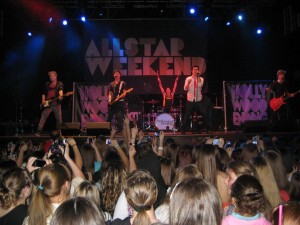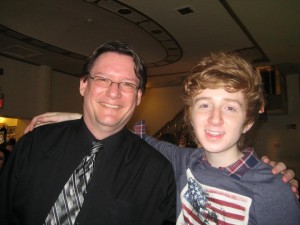The Role Call is another band I first came across on Twitter, and got to build a connection with. They’ve been featured here before, in a guest post they wrote about the Kickstarter they did for their most recent EP. We finally connected for an interview. Hailing from Minneapolis, MN, The Role Call consists of Joey Russ on drums, Kristoff Druva on bass, Joe Jorde on guitar, Max Young on guitar, and Steve Zerwas, who answered these questions, on vocals. I really enjoy their sound, especially this most recent EP.
ANTHONY: Hello, The Role Call! The last time you visited, it was in a guest post to promote the Kickstarter for your second EP. So let’s start there: how much did the Kickstarter raise, and how quickly were you able to start on the new EP?
THE ROLE CALL: Hey! The Kickstarter raised a little over $2,500 for us which was amazing and helped us put together such an amazing EP. We were actually able to start recording it a couple months later!
ANTHONY: What differences are there between the first EP and the new one?
TRC: The first EP was more of a safe bet, it had some diversity in it but overall it had the same sound and was more of an older feel to it. The new EP hits all sorts of bases with each song being completely different than the one before it. “Like I Do” is filled with songs that almost everyone can enjoy.
ANTHONY: Let’s talk about your songwriting process for a moment. How do you approach songwriting, either individually or a group?
TRC: It’s kind of a combination of both, we will write on our own and then come to practice and lay down the idea’s we’ve come up with and see what we can come up with working on that idea as a team. This was the writing process from our last EP and we might do something new this year when we go to write new music. We are a growing band both in fans but also in how we work together so the way we do things is definitely subject to change as we learn more about how each other works.
ANTHONY: Who brings what to the table, both in songwriting and in production?
TRC: We all bring a little bit of everything to the table. Each person is equally capable of writing instrumentals or saying “this would sound cool here” both in production and recording. I’m (Steven) also perfectly fine with suggestions as to the direction of a song lyrically or suggestions of lines that they like as well. A band is more than just one person so the music should be writing by more than one person, ya know?
ANTHONY: You’ve had some membership changes since the first EP, correct? Tell us about the new line-up.
TRC: Yes we have! Zach our old guitarist had left (on very good terms) to pursue other things and we fully support that. Since his departure we picked up Joe Jorde on leads and have been playing with him since. He’s a pretty unique guitarist, he actually never uses a pick and I thought that was really interesting!
ANTHONY: I wonder how many of the musicians I’ve interviewed can say that. The first single and video off of the new EP is “She’s All I Think About.” Where and when was the video filmed?
TRC: It was filmed partly in a studio in a suburb of Minneapolis and then the performance part was a filmed in a studio at the University of Minnesota. It was all filmed in a couple days. One in March and the other in April!
ANTHONY: The new EP also features “Indestructible” (perhaps my favorite track, tied with “Like I Do”), which features guest vocals from the incomparable Sam Miller of Paradise Fears. How did that collaboration come about?
TRC: We have known Paradise Fears for a long time and as we were writing the song in Nashville we decided it would be amazing to have some guest vocals on it. We started talking about who and then Sam Miller came up and we stopped thinking of anyone else because we knew he would be perfect. We sent it over to Sam and he was happy to do it!
ANTHONY: Is there a tour in the near future? Another video? What’s coming up for The Role Call?
TRC: We are definitely planning on going out on tour very soon because it’s been a little while since the last one. We are planning on coming out with all sorts of videos, so be sure to look out for those in the future! Other than that, we are planning on writing a new EP and probably touring on that within the next year.
ANTHONY: I’m looking forward to all of that, and you guys are always welcome back here to chat and promote. Now for my usual closing question: What is your favorite book, and what would you say to someone who has never read it to convince them that they should
TRC: My favorite book (Steven) is The Perks of Being a Wallflower, it’s definitely a must read. The characters are all amazing and it’s a very interesting book. I don’t read very often but that book captivated me.
You can find The Role Call on Facebook and their own website, and follow each member of the band individually on Twitter: @JoeyTRC, @KristoffTRC, @JordeTRC, @MaxTRC, and @SteveTRC or follow the band account @TheRoleCallMN.
Of course, you can also find them on their Youtube channel, where you’ll find this video, among others:
















